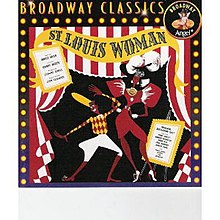St. Louis Woman
| St. Louis Woman | |
|---|---|

1946 Original Cast Recording
|
|
| Music | Harold Arlen |
| Lyrics | Johnny Mercer |
| Book | Arna Bontemps, Countee Cullen |
| Basis | Arna Bontemps' novel God Sends Sunday |
| Productions | 1946 Broadway |
St. Louis Woman is a musical by Harold Arlen (music) and Johnny Mercer (lyrics). The musical opened at the Martin Beck Theatre in New York on March 30, 1946 and ran for 113 performances. The original cast included Robert Pope (Badfoot), Harold Nicholas (Little Augie), Fayard Nicholas (Barney), June Hawkins (Lilli), Pearl Bailey (Butterfly), Ruby Hill (Della Green), Rex Ingram (Biglow Brown), and Milton J. Williams (Mississippi).
It is based upon the novel God Sends Sunday by African-American writer Arna Bontemps.
The idea for St. Louis Woman was originally imagined by Hollywood Producer Ed Gross who wanted to create a musical based upon Arna Bontemps' novel God Sends Sunday. The novel had already been adapted into a straight theatrical stage play by Bontemps and poet Countee Cullen in the early 1930s. Gross wanted a musical for the talents of Lena Horne and thought that a musical version of Bontemps' novel would be a powerful vehicle for her. He approached Cullen to write the book and Arlen and Mercer to write the music for the project. All of them accepted. Although Arlen and Mercer created what some consider to be their best score, the musical suffered from many misfortunes during production. First, the book suffered several serious problems. The show was not really a comedy and did not lend itself to standard Broadway musical treatment of its themes. Throughout the drama, any happiness the characters attain is offset by the deepest feeling of gloom. The correct balance for a musical comedy was never achieved, and a book that could have become an opera was treated neither humorously nor dramatically. These problems were compounded by the fact that Cullen died before rehearsals even began, and Ayers and Rouben Mamoulian, who came in after to work on the show's narrative, could not fix the show's sprawling plot. Second, the N.A.A.C.P. criticised the musical for "offering roles that detract from the dignity of our race". Lena Horne agreed with this assessment and refused to star in the show saying she had no intention of portraying "a flashy lady of easy virtue". When the show eventually opened there were several protests by African-Americans outside the theatre, which negatively affected sales. Finally, the show suffered several staffing problems. The choreographer was replaced midway through production and the show's leading lady, Ruby Hill, was replaced after its pre-Broadway tryout in Boston. Hill returned to the show after only three performances in New York at the insistence of the show's cast, in particular Pearl Bailey. The show opened at the Martin Beck Theater on March 30, 1946, and lasted for 113 performances.
...
Wikipedia
